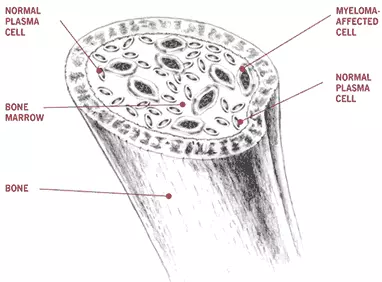Nov 15, 2009
Lenalidomide – bortezomib safe, promising against relapsed multiple myeloma

The combination of the immunomodulatory drug lenalidomide and the proteasome inhibitor bortezomib appears to be both safe and potentially able to induce durable responses in patients with relapsed or relapsed/refractory multiple myeloma, U.S. researchers report online in the Journal of Clinical Oncology.
“Lenalidomide and bortezomib is a well tolerated and very active combination that can overcome resistance to either agent separately,” Dr. Paul G. Richardson of the Dana-Farber Cancer Institute, Boston. He called the median overall survival of 37 months for patients in the study “especially noteworthy in a phase 1 population.”
The report notes,
“The regimen showed efficacy even in heavily pretreated patients who were previously exposed to immunomodulatory agents and to bortezomib.”
The study — the first prospective trial to assess this combination of drugs in patients with relapsed and relapsed/refractory multiple myeloma — included 38 patients (median age, 59 years). Patients were grouped into threes, and each successive group received a higher dose of lenalidomide and/or bortezomib.
Lenalidomide was given orally on each of the first 14 days of a 21-day cycle, and bortezomib was given intravenously on days 1, 4, 8 and 11. Patients whose disease progressed following two cycles could also receive dexamethasone.
The study established the maximum tolerated dose as lenalidomide 15 mg/d plus bortezomib 1.0 mg/m2.
Patients received a median of 10.5 treatment cycles of lenalidomide and 10 of bortezomib. Thirteen patients received both drugs for more than a year, and one patient was still being treated when the study closed in November 2008, having received 74 cycles.
Sixty-one percent of patients achieved at least minimum response. Among patients who had been refractory to previous treatment with lenalidomide, bortezomib or thalidomide, 12 achieved at least minimal response and six achieved at least partial response.
Responses were noted as being durable, with median time to progression of 7.7 months.
Four patients discontinued treatment for toxicities considered to be related to lenalidomide. The most common adverse events were neutropenia, thrombocytopenia and fatigue.
Dr. Richardson told that lenalidomide-plus-bortezomib is also showing promise in two current myeloma studies, including one in patients with relapsed or relapsed/refractory disease.
The study was supported in part by Millennium Pharmaceuticals, Johnson & Johnson Pharmaceuticals Research and Development, and Celgene.
